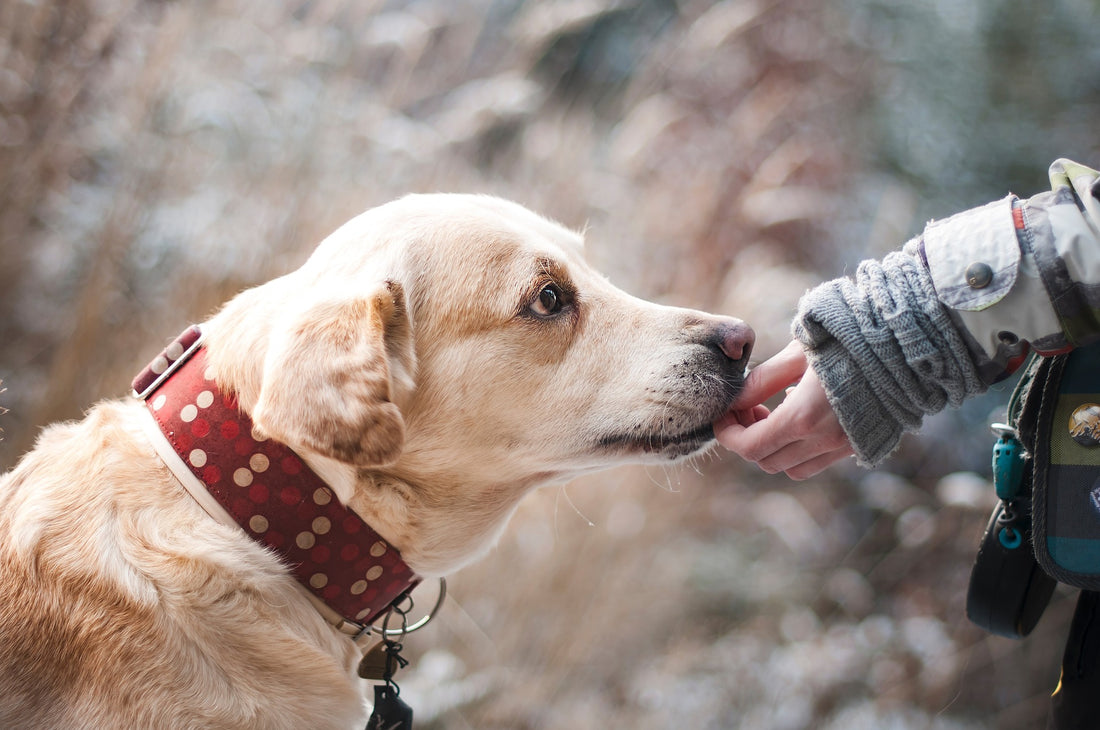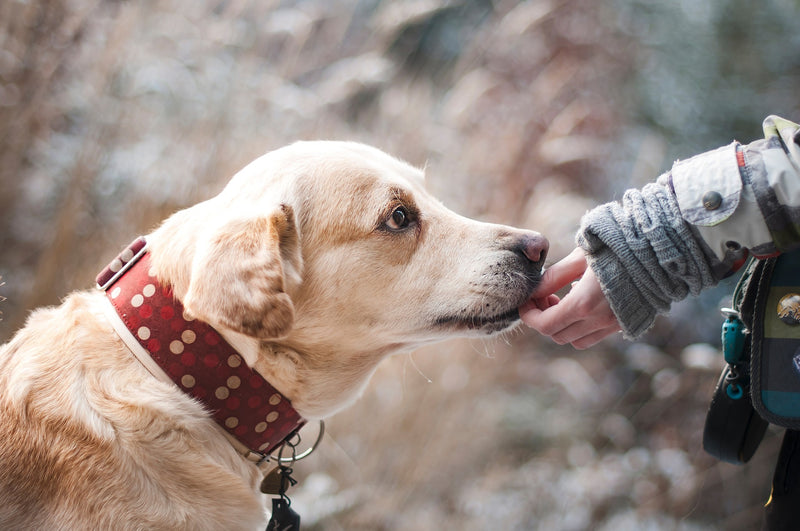Just about every dog will experience a sensitive stomach at some point in their life. We know how disheartening it can be when their food doesn’t stay down after they eat, or worse, goes straight through them. There’s nothing quite as bad as putting them to bed at night in a clean kennel, only to wake up to a messy kennel in the morning.
A dog with a sensitive stomach can be a challenge to handle. However, if this is your dog, there are a few things you can do to nurse them back into tip-top gut health.
How do you soothe a dog’s sensitive stomach issues?
Here’s what you should do right now to ease your dog’s discomfort and soothe their sensitive stomach.
1. Transition them to a simple diet with a limited number of high-quality ingredients. A limited ingredient chicken and rice formula tends to be the easiest on sensitive stomachs.
2. Introduce supplements that support gut health. Probiotics replenish gut flora and help your dog digest their food. A fibrous puree like pumpkin or sweet potato will help make bowel movements more regular. Bone broth replenishes the vital nutrients that have been lost through vomiting or bowel movements. Finally, goat's milk, which contains potassium as well as pre and probiotics, soothes the stomach by neutralizing its acidity and causing instant relief for upset tummies. These supplements will help to get your dog’s system back in balance.
3. Watch them closely for a few days. Keeping your dog in a controlled environment while they recover will increase your chances of eliminating their symptoms.
Sensitive stomachs in dogs don’t simply appear out of nowhere. While some dogs are naturally predisposed to it from allergies or genetics, the vast majority of sensitive stomachs are due to external factors such as stress, diet, or infection. To treat the root cause of your dog’s sensitive stomach and ensure that this doesn’t become an ongoing problem, you’ll need to do some investigating and invest some time into nursing your pup back to health.
Ready to get started? Here’s how to heal your dog’s sensitive stomach.
Start by asking yourself a few questions.
You’ll need to have an idea about what is causing the stomach issues. Let’s get started by asking a few questions.
Has your dog’s diet changed recently?
Sudden and drastic changes in your dog’s diet could cause some issues. Changing things like the type of meat protein (feeding beef instead of chicken), the protein percentage (jumping from a 24% protein formula to a 33% protein formula), or even suddenly changing up the brand of food you’re feeding could lead to digestive upset.
Is your dog currently experiencing a significant amount of stress?
Significant amounts of stress can have a detrimental effect on your pet. Things like separation anxiety, new family members or pets, new environments, or any other significant change in your dog’s daily life could be the root cause of their sensitive stomach.
Does your dog have access to any irritants?
It’s fairly common for dogs that get into things like pesticides, cleaning products, gardening material, or toxic plants to develop a sensitive stomach. Take a look around your property to ensure that your dog hasn’t already gotten into anything potentially poisonous. Be sure to move all potentially poisonous items out of your pup’s reach.
Is it possible that your dog has worms?
Your dog can get worms from their everyday environment. Something as simple as rolling in, sniffing, eating off, or stepping on a contaminated surface could lead to an infestation. Other causes include mosquito, flea, and tick bites, eating infected feces from other animals, or coming into contact with infected animals. Whether indoors, outdoors, working, or playing, a worm infestation can happen to any dog. So if your dog has lost weight, has a dry coat, has diarrhea mixed with blood or mucus, is vomiting, scooting and chewing at their bottom, or any combination of these symptoms, there’s a good chance they have worms.
Please be aware, if left untreated, worms can be potentially life-threatening. It is recommended that dogs are wormed every 6 months as a precaution whether they have an infestation or not.
Is it possible that your dog could have a bacterial infection?
Bacterial infections in the gut can cause watery stools, explosive diarrhea, lethargy and sluggishness, restlessness, and vomiting. Because of these symptoms, dogs with bacterial infections are at greater risk of dehydration—especially the smaller dog breeds. These types of infections usually come from drinking stagnant water, other infected dogs, or wounds that have gone untreated. If you suspect that your dog has a bacterial infection, the only way to treat them is with an antibacterial medication prescribed by a vet.
While these situations could potentially cause your dog’s symptoms, most sensitive stomach issues are diet-related. They can be solved by simply implementing an elimination diet combined with easy, gut-healthy supplements.
What sort of diet is best for my dog’s sensitive stomach?
The best diet for a dog with a sensitive stomach is one that is simple, sustainable, and can be fed consistently. Once you find something that your dog can eat without any upset, don’t deviate from that diet and keep up on the added supplements. Sticking to this diet for at least a few weeks will give your dog the best chance to reset and prevent future digestive upset.
Their diet should be filled with simple, high-quality ingredients that are digestible, low in fat, and have minimal carbs. You should avoid any kibble formulas that include animal by-products on the label. Likewise, avoid formulas with fillers like corn, wheat, or soy listed in the first 5 ingredients. Some sort of named animal protein should make up about 70% of your dog’s diet and be listed within the first 3 ingredients on the label. This can be something like “chicken meal” or just “chicken”.
Your goal is to find a food with the highest quality protein, while still being limited in other ingredients. This is the type of diet your dog is biologically meant to have. The closer to raw that you can get your dog’s diet, the easier it is for them to digest. Raw ingredients still have digestive enzymes that help your dog absorb more of the nutrients in their diet. This ultimately leads to less work for their digestive system, less waste, and happier stomachs.
Diet tip: slow down!
Some dogs self-sabotage by scarfing down their food as quickly as possible and then needing to vomit it back up. An overfilled belly is an unhappy belly. If your dog is vomiting directly after eating, slow them down by using a slow feed bowl or by simply spreading their food out in multiple bowls instead of feeding in a single spot.
What sort of supplements should I give my dog for their sensitive stomach?
A healthy diet will go a long way when looking to solve sensitive stomach issues. However, you may find that even with a simple diet full of high-quality ingredients, your dog still has some stubborn symptoms. This is where supplements come in! Here are the three key supplemental items you should be adding to your dog’s diet to help them recover from a sensitive stomach.
Probiotics.
If they have been sick recently, your dog’s digestive system is bound to be depleted of the healthy bacteria it needs to process the nutrients from their food. Introducing a probiotic supplement to their diet is an easy way of replenishing these good bacteria.
Your dog needs a healthy gut biome full of good bacteria that flourish on the food they eat. These bacteria absorb the nutrients from your dog’s food and make those nutrients available for use by the body. Without a healthy gut biome, food is not absorbed properly and can either move too slowly through the digestive system (causing constipation), move too quickly (leading to diarrhea), or cause belly pain and gas.
Pumpkin.
This natural supplement acts as a digestive regulator—providing relief regardless of the sort of digestive upset your dog is experiencing. Simply mix some single-ingredient pureed pumpkin into your dog's regular food. The amount of pumpkin you should give will depend on how big your dog is.
The increased fiber content in pumpkin both absorbs any excess water in your dog’s stool and pushes it along the digestive tract. This firms up their stool and helps them to pass it easily at healthy intervals, instead of explosively without warning. This means that if your dog is dealing with constipation or diarrhea, pumpkin helps move things along!
It’s important to note that your dog needs to be properly hydrated as you add pumpkin to their diet. If your dog is already dehydrated while adding in an increased amount of fiber, their dehydration can become worse and could develop into a new problem.
Bone broth.
Bone broth is packed with essential vitamins, minerals, and amino acids that help soothe symptoms of digestive upset and repair any damage done to the gut and gut lining. This supplement is integral to reversing the long-term damage that could come from your dog’s digestive upset.
How to heal my dog’s sensitive stomach? Keep the treatment going!
Sometimes a sensitive stomach has a simple fix. Sometimes not so much. In either case, the best way to ensure that these issues do not persist is to remain consistent with the solutions that work.
Disclaimer: we are not vets. If you’re concerned for your dog's health, the best thing to do is take them to a vet


